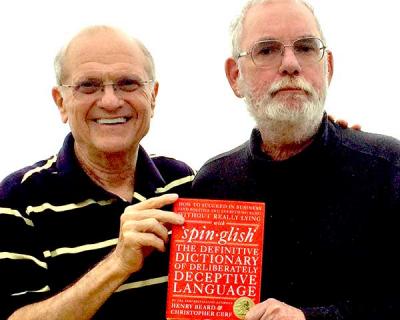True Falsification

“Spinglish”
Henry Beard and Christopher Cerf
Blue Rider Press, $27.50
A new book by two part-time South Fork residents is a shrewdly amusing screed that George Orwell, whom the authors acknowledge, might have written if he’d grown up amid the quick-witted irreverence of The Harvard Lampoon, as the co-authors did in their undergraduate days.
The title titillates: “Spinglish: The Definitive Dictionary of Deliberately Deceptive Language.” The cover satirically promises “How to succeed in business (and politics and everything else) without really lying.” Mostly an up-to-date compendium of misleading euphemisms, the book also has a 30-page bilingual dictionary so you can easily look up a euphemistic replacement for, say, budget cuts (“savings”).
Henry Beard has written or co-written some 50 humorous books, like “Poetry for Cats” and “The Official Exceptions to the Rules of Golf.” His equally prolific collaborator, Christopher Cerf, was an early colleague on The National Lampoon and a producer of the PBS literacy education program “Between the Lions”; he is the son of the publisher and punster Bennett Cerf.
With a distinct liberal bias, the book updates the apparently universal human tendency to “spin” the truth that Orwell famously analyzed in his 1946 essay “Politics and the English Language” and illustrated in the propaganda slogans of “1984” (“Ignorance Is Strength,” “Freedom Is Slavery”). The authors freely acknowledge their place in a long line of Orwell heirs, also ironically tipping their toques to Edward Bernays, the legitimately recognized founder of modern public relations, and to Frank Luntz, a Republican strategist who, they say, advised candidates to prettify oil drilling as “energy exploration” and capitalism as “free market economy.”
The variegated entries bespeak a savvy, sophisticated interest in near-falsification. “Capital punishment” mutes “death penalty,” “challenge” puts an optimistic spin on “problem,” “client” is “mortuary workers’ term for corpse,” “coercive diplomacy” has been substituted for “bombing,” “nonperforming asset” for “bad loan.” The book defines “bloc” as “an alliance or coalition of nations of which the speaker or writer disapproves,” following with a quote from a 1991 scholarly publication reporting that “Western leaders commonly characterized the group of countries allied with the USSR as the ‘Eastern Bloc’ or the ‘Communist Bloc’ but almost never as the ‘Eastern Alliance’ or ‘Communist Coalition.’ ”
The dodges are documented in 98 pages of citations often drawn from the work of other candor cops. “Business manager” for “pimp” was reported in a 2014 Slate article on how “Sex-Work Bosses Attempt to Rebrand”; “bangalored,” meaning “fired after your job was outsourced to India,” comes from an earlier Beard/Cerf confection, their 1993 “The Official Politically Correct Dictionary and Handbook.”
In an era when “most newspapers don’t have foreign staffs anymore,” the phrase “by our foreign staff” frequently means “we lifted this from the newswires,” according to “a jargon connoisseur” named Robert Hutton. For real-estate watchers, when an ad says a property is “tranquil,” the authors cite the translation of a San Francisco real estate agent named Tara-Nicholle Nelson: “not near anything you care about.”
Even sending up conventional reference books, the text is peppered with illustrations carrying chortle-inducing captions, like a photo labeled “Count Leo Tolstoy, author of the nineteenth-century Russian classic ‘Kinetic Military Action and Permanent Pre-Hostility.’ ” The last entry in the “English-to-Spinglish” dictionary is a deft thrust at anti-abortionists. “Zygote,” the authors say, can be twisted into “pre-born baby.”
But all is not liberal-leaning current affairs. Mr. Beard and Mr. Cerf cheekily award themselves a gold seal, embossed on the dust jacket, signifying the book as “Winner of the Bullitzer Prize in fiction and nonfiction.” The seal bears a portrait of a long-nosed, 18th-centuryesque Pinocchio and the mock-Latin motto “Stercus Tauri” (manure of bulls).
Henry Beard has a house in East Hampton, and Christopher Cerf is a part-time resident of Springs.
Christopher T. Cory blogs and contributes to The Star from a house behind the East Hampton Library.
